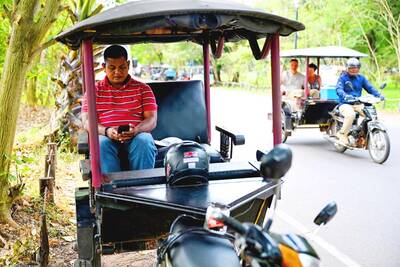Babies whose low-income mothers received significant monthly cash support had more brain activity associated with thinking and learning after one year, a study said yesterday.
The paper published in the journal Proceedings of the National Academy of Sciences describes the first results of an ongoing US study looking at how reducing poverty can affect cognitive behavior.
“We have known for many years that growing up in poverty puts children at risk for lower school achievement, reduced earnings and poorer health,” study senior author Kimberly Noble told reporters.
However, until now it was unknown whether this difference came from the lack of financial resources itself or other factors commonly associated with poverty.
“This is the first study to show that reducing poverty changes child brain development,” Noble said.
In 2018, Noble and her team began recruiting 1,000 low-income mothers and their newborn babies from maternity wards in four major US cities for the “Baby’s First Years” randomized control trial.
They assigned some of the women to receive a nominal monthly stipend of US$20, while others received US$333.
For the mothers in the study, who reported average annual earnings of just over US$20,000 dollars, the larger gift corresponded to a 20 percent boost.
As the children turned one, researchers went to their homes with a special infant EEG monitor — a device that detects electrical signals within the brain — to measure their brain activity.
They monitored 435 of the 1,000 infants before the COVID-19 pandemic prevented them from visiting the families to carry out readings and found a stark difference between which babies showed more high-frequency brain activity associated with learning.
“As the frequency gets higher, you see more for the infants in the high cash gift group,” the study’s lead author Sonya Troller-Renfree told reporters.
Children with less cash support showed less of that brain activity, the study said.
Noble said that the amount allocated to the high cash gift group was intentional.
A 2010 study in the American Economic Journal: Applied Economics showed a US$4,000 difference in annual income early in childhood is associated with higher school achievement.
The amount is also comparable to benefits that some of the mothers studied might qualify for.
“It was an amount that we thought might both move the needle and hold some policy relevance,” Noble said.
As the study was focused on the effect of direct financial support on cognitive behavior, it was important that the cash gifts be given without conditions attached.
However, the next steps of the “Baby’s First Years” research is to look at how the money was spent, based on information volunteered by the mothers.
The project would continue to monitor the families until the babies are four years and four months old.

The death of a former head of China’s one-child policy has been met not by tributes, but by castigation of the abandoned policy on social media this week. State media praised Peng Peiyun (彭珮雲), former head of China’s National Family Planning Commission from 1988 to 1998, as “an outstanding leader” in her work related to women and children. The reaction on Chinese social media to Peng’s death in Beijing on Sunday, just shy of her 96th birthday, was less positive. “Those children who were lost, naked, are waiting for you over there” in the afterlife, one person posted on China’s Sina Weibo platform. China’s

‘NO COUNTRY BUMPKIN’: The judge rejected arguments that former prime minister Najib Razak was an unwitting victim, saying Najib took steps to protect his position Imprisoned former Malaysian prime minister Najib Razak was yesterday convicted, following a corruption trial tied to multibillion-dollar looting of the 1Malaysia Development Berhad (1MDB) state investment fund. The nation’s high court found Najib, 72, guilty on four counts of abuse of power and 21 charges of money laundering related to more than US$700 million channeled into his personal bank accounts from the 1MDB fund. Najib denied any wrongdoing, and maintained the funds were a political donation from Saudi Arabia and that he had been misled by rogue financiers led by businessman Low Taek Jho. Low, thought to be the scandal’s mastermind, remains

Australian Prime Minister Anthony Albanese yesterday announced plans for a national bravery award to recognize civilians and first responders who confronted “the worst of evil” during an anti-Semitic terror attack that left 15 dead and has cast a heavy shadow over the nation’s holiday season. Albanese said he plans to establish a special honors system for those who placed themselves in harm’s way to help during the attack on a beachside Hanukkah celebration, like Ahmed al-Ahmed, a Syrian-Australian Muslim who disarmed one of the assailants before being wounded himself. Sajid Akram, who was killed by police during the Dec. 14 attack, and

VISHNU VANDALS: A Cambodian official accused Thailand of destroying a statue in a disputed border area, with video showing the Hindu structure being torn down The Thai military said ceasefire talks with Cambodia, set to begin yesterday, are expected to conclude with a meeting of the countries’ defense ministers on Saturday, as the two sides seek to end weeks of deadly clashes. The talks started at 4pm in Thailand’s Chanthaburi Province, which borders Cambodia. The Thai Ministry of Defense outlined several demands to be discussed ahead of the bilateral meeting of the General Border Committee (GBC) on Saturday. If secretariat-level discussions fail to reach agreement on key technical frameworks such as troop deployments, the Thai side would not proceed with the GBC meeting or sign any agreement on